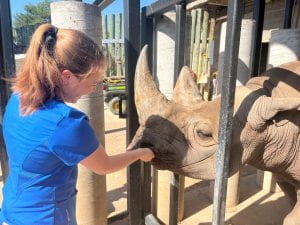
Macho the black rhino greets his adoring fans before undergoing routine venipuncture.
My experience as a first-year vet student in 2020 was largely shaped by the pandemic and the many limitations it imposed. When I first learned about the Abilene Zoo in April 2021, it was through a Cornell Zoo and Wildlife Society (ZAWS) lecture given by Dr. Stephanie Carle, the Abilene Zoo’s senior veterinarian, over Zoom. Spending my lunch hour puzzling through case-based questions with my classmates (albeit virtually) offered a glimpse into the many opportunities available to us as veterinary students—something I had lost sight of somewhat amid the organized chaos of first year. Dr. Carle concluded her talk by discussing the Abilene Zoo’s veterinary externship program. Immediately, I had my sights set on participating in the program.
I had my chance in June 2022 when, funded by a Student American Veterinary Medical Association (SAVMA) Veterinary Experience Grant, I traveled to Abilene, Texas for a three-week externship. It was an adventure over a year in the making, and despite how high I had allowed my expectations to climb in that time, the experience managed to exceed them.
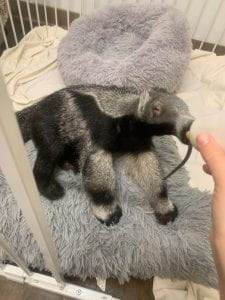
Daphne enjoys her morning feeding!
The Abilene Zoo is home to over 280 species. The first resident I met upon my arrival was also one of the zoo’s newer residents. Daphne is a giant anteater who was born at the zoo in March of 2022 and, upon my arrival, was living in the clinic to receive round the clock care from the zoo’s veterinary and animal care staff. Daphne is a twin, and her mother was unable to care for both Daphne and her twin brother Arnaud. With input from zoos across the country, the Abilene Zoo was able to craft a customized care plan for Daphne that allowed her to gain weight and overcome a myriad of complications so that by the time I met her, she was thriving.
During my time at the zoo, I had the opportunity to bottle feed Daphne and to accompany her on her excursions to see the zoo and interact with her anteater family members. As I told Daphne during one of her late-night bottle feedings, I am also a twin and, unlike my sister, I spent an extended period in the hospital as a baby. I thought Daphne might appreciate that we were kindred spirits. (Her expression remained pretty neutral, so it’s hard to say if the point hit home. Perhaps I saw the corner of her long snout pull up in a smile.)
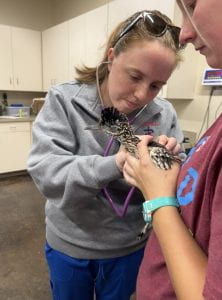
One of the zoo’s resident roadrunners undergoes a pre-shipment exam.
While I spent lots of time with Daphne, I also had opportunities to interact with many of the zoo’s species. Highlights of my experience included assisting with a pre-shipment exam for a roadrunner, helping to treat pododermatitis in one of the zoo’s resident flamingoes, participating in a neonatal exam of a steenbok, and medicating a capybara with conjunctivitis.
Other favorite opportunities included monitoring Jamie, a heavily pregnant giraffe in the zoo’s herd, and examining Rico, a fossa hospitalized after fracturing his humeral condyle. I was ultimately able to travel with a team from the zoo to Dallas Veterinary Surgical Center to observe Rico’s orthopedic surgery.
When I wasn’t seeing cases in the hospital with Dr. Carle and Dr. Mike Nance, the zoo’s second veterinarian, I was able to explore the zoo and gained a better understanding of the husbandry practices used by zoo staff to keep the collection animals healthy and happy. I was also able to participate in events hosted by the zoo, including Dreamnight, a cost-free event allowing children with special medical needs to enjoy the zoo with their families. This allowed me to feel at home in Abilene.
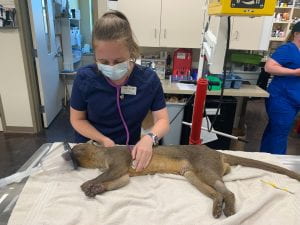
Rico the fossa receives a physical exam after sustaining an orthopedic injury.
The Abilene Zoo is also home to a clinic exclusively for injured and orphaned native birds. While I worried that my bird experience was somewhat deficient when I arrived in Abilene, during my externship I was able to practice my diagnostic and clinical skills while also improving my native bird identification skills. I didn’t expect to enjoy my work in the rehabilitation center as much as I did. However, working towards returning wild birds to their habitats, thereby giving them a second chance and helping to support their ecosystems, was incredibly rewarding.
When I wasn’t at the zoo, I was grateful to be able to accompany Dr. Carle and Dr. Nance as they fulfilled their other professional obligations. During my three weeks, their enthusiasm for teaching and fielding questions never waned. I visited the Abilene Animal Services Adoption Center to complete evaluations of new small animal residents, and also joined Dr. Carle during her shifts at the local emergency clinic. There, I saw cases I likely wouldn’t have encountered in the northeast, including advanced heartworm disease and rattlesnake envenomation.
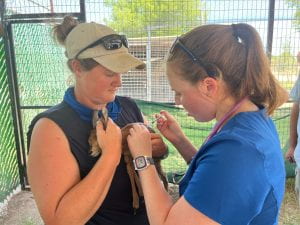
A neonatal steenbok undergoes her first exam.
I gained a great deal of knowledge from participating in the journal group at the zoo and working through sample cases with the veterinary team. I was able to live at the zoo throughout my externship, so my down time was spent conducting research and preparing a presentation I gave at the close of the externship on nutritional care for zoo animals.
I am tremendously thankful for all of the people and animals I met and learned from while in Abilene. I left this externship armed with new knowledge and skills, photos to cherish, mentors to look up to, and a newfound appreciation for Texas cuisine.
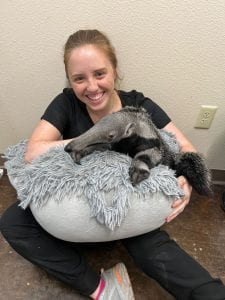
More bonding time with Daphne!
 Colleen Sorge, Class of 2024, is a Cornell DVM student from Long Island, NY. She obtained her undergraduate degree in Animal Science from Cornell University in 2020. She has a wide range of interests within the veterinary field, including both small animal and wildlife medicine.
Colleen Sorge, Class of 2024, is a Cornell DVM student from Long Island, NY. She obtained her undergraduate degree in Animal Science from Cornell University in 2020. She has a wide range of interests within the veterinary field, including both small animal and wildlife medicine.

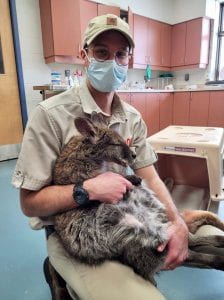 If Dr. Benjamin Jakobek decides to write a book, I will be first in line to buy it. As he tells me about some of the projects he’s been a part of, including capturing and collaring muskox in Nunavik and working to transport caribou to a protected environment, he is a reminder to all of us aspiring veterinarians that we will one day have the capability and arguably, the responsibility, to help protect wild animals and places around the world. After obtaining his DVM from Cornell University College of Veterinary Medicine in 2020, Dr. Jakobek completed a one-year small animal rotating internship at the University of Prince Edward Island. Now, he is a zoological medicine resident and a master’s student at the University of Montréal focusing on free-ranging wildlife health management. Though each day’s work is different, Dr. Jakobek divides the bulk of his time between the Granby Zoo, the Aquarium of Québec, the University of Montréal’s wildlife pathology service and raptor clinic, as well as federal and provincial wildlife agencies. His current program gives him the opportunity to hone his research and his clinical skills into something he calls “the opportunity of a lifetime.” This program has allowed him to work on research projects ranging from studying toxoplasmosis in endangered beluga whales to environmental interventions against Lyme disease, among many others.
If Dr. Benjamin Jakobek decides to write a book, I will be first in line to buy it. As he tells me about some of the projects he’s been a part of, including capturing and collaring muskox in Nunavik and working to transport caribou to a protected environment, he is a reminder to all of us aspiring veterinarians that we will one day have the capability and arguably, the responsibility, to help protect wild animals and places around the world. After obtaining his DVM from Cornell University College of Veterinary Medicine in 2020, Dr. Jakobek completed a one-year small animal rotating internship at the University of Prince Edward Island. Now, he is a zoological medicine resident and a master’s student at the University of Montréal focusing on free-ranging wildlife health management. Though each day’s work is different, Dr. Jakobek divides the bulk of his time between the Granby Zoo, the Aquarium of Québec, the University of Montréal’s wildlife pathology service and raptor clinic, as well as federal and provincial wildlife agencies. His current program gives him the opportunity to hone his research and his clinical skills into something he calls “the opportunity of a lifetime.” This program has allowed him to work on research projects ranging from studying toxoplasmosis in endangered beluga whales to environmental interventions against Lyme disease, among many others.

 Looking towards his future, Dr. Jakobek remains interested in both clinical medicine and research. He is particularly drawn to work in more remote areas of the world. “I think this appeals to me because it’s in those remote places that you find rich biodiversity and natural habitats often needing research and support for their protection.” Another highlight of his residency has been working alongside different community stakeholders to conserve habitats and safeguard wild species. He describes a particularly impactful experience transporting caribou alongside wildlife biologists, indigenous peoples, wildlife technicians, and veterinarians, all of whom wanted to ensure the survival of this particular caribou population, of which there were only seventeen individuals remaining. Of course, while his experiences during his residency have been rewarding, he is also frequently reminded of the progress still to be made. “This work [with caribou] shows how important it is to protect wildlife habitats while we still have them and value wildlife, while we have the great fortune to be able to share the planet with them.”
Looking towards his future, Dr. Jakobek remains interested in both clinical medicine and research. He is particularly drawn to work in more remote areas of the world. “I think this appeals to me because it’s in those remote places that you find rich biodiversity and natural habitats often needing research and support for their protection.” Another highlight of his residency has been working alongside different community stakeholders to conserve habitats and safeguard wild species. He describes a particularly impactful experience transporting caribou alongside wildlife biologists, indigenous peoples, wildlife technicians, and veterinarians, all of whom wanted to ensure the survival of this particular caribou population, of which there were only seventeen individuals remaining. Of course, while his experiences during his residency have been rewarding, he is also frequently reminded of the progress still to be made. “This work [with caribou] shows how important it is to protect wildlife habitats while we still have them and value wildlife, while we have the great fortune to be able to share the planet with them.”
 Colleen Sorge, Class of 2024, is a Cornell DVM student from Long Island, NY. She obtained her undergraduate degree in Animal Science from Cornell University in 2020. She has a wide range of interests within the veterinary field, including both small animal and wildlife medicine.
Colleen Sorge, Class of 2024, is a Cornell DVM student from Long Island, NY. She obtained her undergraduate degree in Animal Science from Cornell University in 2020. She has a wide range of interests within the veterinary field, including both small animal and wildlife medicine.
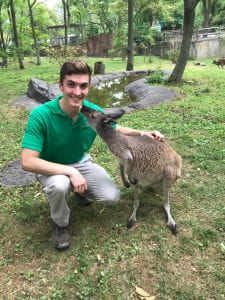
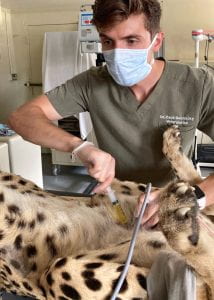
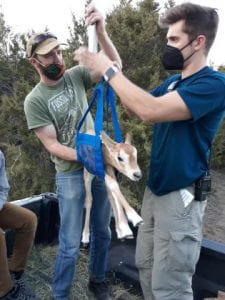
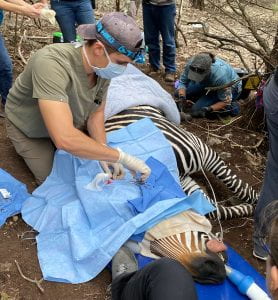
 Dr. Matt Marinkovich always had a passion for wildlife but was initially unsure as to what career path might suit him best. “I always knew I wanted to do something with wildlife or something conservation related, but it took a little while to find what that niche was, whether PhD or vet school. I had a couple experiences at SeaWorld San Diego when I was in undergrad and at the National History Museum in Santa Barbara working with the Marine Mammal Stranding Network that led me to really feel like veterinary medicine was the route to go.” After taking 3 gap years, he began his time at Cornell Vet, going on to complete his DVM in 2014.
Dr. Matt Marinkovich always had a passion for wildlife but was initially unsure as to what career path might suit him best. “I always knew I wanted to do something with wildlife or something conservation related, but it took a little while to find what that niche was, whether PhD or vet school. I had a couple experiences at SeaWorld San Diego when I was in undergrad and at the National History Museum in Santa Barbara working with the Marine Mammal Stranding Network that led me to really feel like veterinary medicine was the route to go.” After taking 3 gap years, he began his time at Cornell Vet, going on to complete his DVM in 2014. While well aware that the field of zoological medicine is competitive, Dr. Marinkovich has a refreshing viewpoint. “I think really just focusing on becoming the best vet you can be is the number one step. I think what we look for in terms of a good resident is someone who has a really good foundation in veterinary medicine, and that involves all species. The next time you have to help pull a calf, it may be an exotic bovid rather than a dairy cow.” His perspective, he says, is largely informed by his respect for mental health. “I’m a huge proponent of mental health and being happy with what you’re doing and enjoying each step of the journey. I think you need to take each step and try to get the most out of each experience for what it is. It’s great if zoo residency or working a zoo job works out, but if not, being a vet is an awesome job and you still have that to be fulfilled by. You have to try to not let the quest for that elusive zoo resident position to be the end all and be all of what it means to be fulfilled in this field. Developing your skill sets, really focusing on your own mental health, and who you are as a vet and as a person is going to set you up for success.”
While well aware that the field of zoological medicine is competitive, Dr. Marinkovich has a refreshing viewpoint. “I think really just focusing on becoming the best vet you can be is the number one step. I think what we look for in terms of a good resident is someone who has a really good foundation in veterinary medicine, and that involves all species. The next time you have to help pull a calf, it may be an exotic bovid rather than a dairy cow.” His perspective, he says, is largely informed by his respect for mental health. “I’m a huge proponent of mental health and being happy with what you’re doing and enjoying each step of the journey. I think you need to take each step and try to get the most out of each experience for what it is. It’s great if zoo residency or working a zoo job works out, but if not, being a vet is an awesome job and you still have that to be fulfilled by. You have to try to not let the quest for that elusive zoo resident position to be the end all and be all of what it means to be fulfilled in this field. Developing your skill sets, really focusing on your own mental health, and who you are as a vet and as a person is going to set you up for success.” 
 For students looking to enter the increasingly competitive field, Dr. Radcliffe’s first suggestion is to capitalize on the opportunities we have here at Cornell Vet. “I think there’s a lot of expertise here at Cornell and there’s a lot of opportunities.” These include Engaged Cornell, Expanding Horizons, and a myriad of courses aimed at students interested in pursuing careers in zoo, wildlife, and exotics medicine. Dr. Radcliffe teaches a 3-part course called Conservation with Communities for One Health, which reflects the multi-disciplinary mindset crucial to effective conservation work. Both undergraduate and veterinary students are able to take this course, and a subset of them travel in teams to field sites in the Congo, Uganda, and Indonesia to participate in projects with institutions that Dr. Radcliffe has built relationships with over the years, including the Jane Goodall Institute and WWF-Indonesia. Coursework aside, Dr. Radcliffe encourages students to take advantage of networking opportunities and to pursue externships that excite them.
For students looking to enter the increasingly competitive field, Dr. Radcliffe’s first suggestion is to capitalize on the opportunities we have here at Cornell Vet. “I think there’s a lot of expertise here at Cornell and there’s a lot of opportunities.” These include Engaged Cornell, Expanding Horizons, and a myriad of courses aimed at students interested in pursuing careers in zoo, wildlife, and exotics medicine. Dr. Radcliffe teaches a 3-part course called Conservation with Communities for One Health, which reflects the multi-disciplinary mindset crucial to effective conservation work. Both undergraduate and veterinary students are able to take this course, and a subset of them travel in teams to field sites in the Congo, Uganda, and Indonesia to participate in projects with institutions that Dr. Radcliffe has built relationships with over the years, including the Jane Goodall Institute and WWF-Indonesia. Coursework aside, Dr. Radcliffe encourages students to take advantage of networking opportunities and to pursue externships that excite them.

